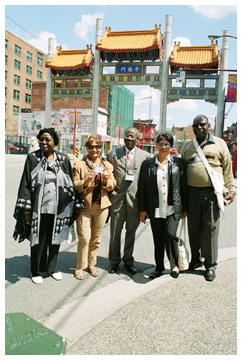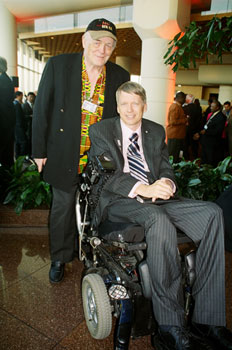|
Africans
Active at UN World Urban Forum in Vancouver
Tourism Generates Jobs,
by
Jerry W. Bird, Editor
 What
a memorable week. After 30 years UN Habitat returns
to its launching pad - the seaport city of
Vancouver,
British Columbia Canada. The crowd is estimated at
10,000 plus and it certainly seems so, judging by
the heavy attendance at many sessions. At the time
of writing, we have had the pleasure of taking two
groups of mayors representing different African
countries on tours of Vancouver and the University
of British Columbia. It's one way for us to repay
the wonderful hospitality we have enjoyed in eleven
years with the Africa Travel Association as its
media voice in North America and
Worldwide. What
a memorable week. After 30 years UN Habitat returns
to its launching pad - the seaport city of
Vancouver,
British Columbia Canada. The crowd is estimated at
10,000 plus and it certainly seems so, judging by
the heavy attendance at many sessions. At the time
of writing, we have had the pleasure of taking two
groups of mayors representing different African
countries on tours of Vancouver and the University
of British Columbia. It's one way for us to repay
the wonderful hospitality we have enjoyed in eleven
years with the Africa Travel Association as its
media voice in North America and
Worldwide.
The
twin goals of Habitat are "Adequate shelter for
all" and "sustainable human settlements development
in an urbanizing world. "The "Global Village" is
well represented, this week - with Africa making a
particularly strong showing. As publishers of
Africa Travel Magazine and related travel business
media features, we were extremely pleased and
honored to be able to to network with so many of
our African colleagues. We will introduce key
African delegates and speakers to you via radio
interviews and photos as this important feature
unfolds. Our editors encountered another big
surprise on arrival at the Expo Media Center, where
many African print and broadcast media were
present, giving us ample opportunity to exchange
views and share ideas. Many delegates requested
complimentary copies of Africa Travel magazine.
These issues from our archives cover a wide range
of African destinations and topics.
 The
impact of Urban Development on African Tourism goes
without saying - and this event, along with Globe
2006 World's Largest Enviro-Business Expo, also in
Vancouver, open up a broad avenue for our editorial
group. The week started off with a keynote address
by Hon. Stephen Harper, Prime Minister of Canada.
followed by Vancouver Mayor Sam Sullivan, and BC
Premier Gordon Campbell. The
impact of Urban Development on African Tourism goes
without saying - and this event, along with Globe
2006 World's Largest Enviro-Business Expo, also in
Vancouver, open up a broad avenue for our editorial
group. The week started off with a keynote address
by Hon. Stephen Harper, Prime Minister of Canada.
followed by Vancouver Mayor Sam Sullivan, and BC
Premier Gordon Campbell.
Africans
have made a strong showing at this world class
event, as they have at the 2006 World Cup in
Germany. On day four we attended the Mayors
Roundtable at Simon Fraser University's downtown
campus, and later at the World Mayors Reception we
had a brief dialogue with host Mayor Sam Sullivan,
who has a high profile worldwide and will host the
Winter Olympics in 2010. We finished off an
outstanding day at a special evening event hosted
by Kenya, networking with dignitaries from cities
and the federal scene.
AFRICANS
ON VIDEO: Comments from the African delegates are
available in Video Clips thanks to Sustainability
Corner, which operated from a broadcast stage at
the entrance to the Expo. Not only did our editor
get an opportunity to introduce Africa Travel
Magazine to the world, we were provided with
interviews from a wide cross section of Africans
from Cabinet Ministers to professionals of all
stripes. www.sustainabilitycorner.com
ACTION
ON SLUM IMPROVEMENT
Rose Molokoane: South African Homeless
People's Federation anchored a panel on this vital
topic, which attracted many members of the world
press, most especially Africa Travel Magazine. A
leading world figure on Rose's panel was Mr. Jockin
Arputham is President of the National Slum Dwellers
Federation (NSDF) of India. This organization is
one of the largest urban poor organizations and
social movements in the world. He is also President
of Slum/Shack Dwellers International (SDI), an
umbrella group formed by urban poor and homeless
federations from many different nations - as they
support each other and learn from each other.
Having worked for more than 40 years in slums and
shanty towns, building representative organizations
and demonstrating what slum-dwellers' own
organizations are capable of, he has shown what
powerful partners slum dwellers can be for
governments and international agencies. Mr.
Arputham set up NSDF in India which developed to
become a mass movement with hundreds of thousands
of slum dwellers as members. Mr. Arpurtham is also
an active Member of the UN Advisory Group on Forced
Evictions. In 2000, he received the Ramon Magsaysay
Award, Asia's version of the Nobel
Prize.
Mayors,
such as Patricia Applagyel of Kumasi, Ghana';s
second largest city, are among our favorite people,
not just the friendly Africans we met at the UN
World Urban Forum, but as publishers we've had a
dialogue with mayors in our own province for
decades by covering the annual Union of BC
Municipalities Expo. Former mayor Russ Helburg of
Port Hardy was of great help for years and was
featured in our first airport magazine in the early
90s. Not long ago I was
keynote speaker
at a Trans Canada Highway Association 59th
Anniversary Conference and mayors in my audience
came from half of Canada, some 2,000 km from Lake
Manitoba to the :Pacific. They were a very
appreciative audience. Small wonder we love dealing
with mayors. Patricia was featured on a cover page
of the Vancouver Sun Newspaper following the forum.
We stayed in Kumasi earlier this year during our
tour of Ghana and were greatly impressed by its
outstanding potential for tourism development.
Rose, who is an avid gardener and lover of beauty,
along with David, her colleague from Tema, near
Accra, joined Muguette and I for a tour of the
University of British Columbia campus, with stops
at the Memorial Gardens and the UBC Museum of
Anthropology.
Anna
Kajumulo Tibaijuka of Tanzania,
Under-Secretary-General and Executive Director,
UN-HABITAT, highest ranking African woman in the
United Nations, gave an outline of the program';s
purpose. "As the international community celebrates
Vancouver + 30, it should also reflect on the
important lessons learned in urban development and
the need to reduce inequalities within cities.
Cities present an unparalleled opportunity for the
simultaneous attainment of most, if not all, of the
internationally agreed development goals.
Interventions in, for example, poor water and
sanitation, have immediate positive knock-on
effects in terms of improved health, nutrition,
disease prevention and the environment. However,
unless such concerted action is taken to redress
urban inequalities, cities may well become the
predominant sites of deprivation, social exclusion
and instability worldwide."
FACES AND
VOICES OF AFRICA AT THIS EVENT
The conference speaker list included many high
profile Africans. Here are just some of the people
who shared their expertise and experience with
participants at WUF3:
SPEAKERS
FROM AFRICA
Contact numbers and some biographies
available.
Ali
Mohamed Shein: Vice President, Government of
Tanzania
Harriette
Amissah Arthur. Director, KITE, Ghana
Mary
Balikungeri: Rwanda Women's Network,
Rwanda
Tasneem
Essop: Minister of Environment, Planning and
Economic Development, Government of the Western
Cape, South Africa
Eric
Falt: Director of the Division of
Communications & Public Information, United
Nations Environment Program (UNEP),
Kenya
Bhekokwakhe
Hamilton Cele: Transport Safety and Community
Liaison Officer, KwaZulu Natal, South
Africa
Lamine
Mbassa: Director of Economic and Financial Affairs,
Communauté Urbaine de Douala (CUD),
Cameroon
Jean-Pierre
Mbassi: Secretary General, United Cities &
Local Governments Africa
Smangaliso
Mkhatshwa : Councilor of Tshwane, South
Africa
Abbès
Mohsen: Mayor of Tunis, Tunisia; President
of the Féderation Nationale des Villes
Tunisiennes, Tunisia
Rose
Molokoane: South African Homeless People's
Federation, South Africa
Maria
Mutagamba: Minister of State for Urban Employment
& Poverty Alleviation, Government of Uganda,
Uganda
John
Pombe Magufuli : Minister of Housing, Lands and
Human Settlements, Government of Tanzania, Co-Chair
WUF 3
Lindiwe
Sisulu: Minister of Housing, Government of South
Africa
Local
examples of sustainability
Examples of urban sustainability were just outside
the doors of WUF3. Delegates saw how a waste water
treatment plant works or cycle around the
University of British Columbia campus. Free guided
tours took them off the tourist track to see why
Vancouver is one of the most sustainable cities on
the planet.
RELATED
LINKS
WORLD
MAYOR AWARDS-
AFRICA;
Finalistgs 2006: Mayor of Antananarivo,
Madagascar; Johannesburg, South Africa; Maputo,
Mozambique; Tunis, Tunisia
AFRICA
MUNICIPAL DEVELOPMENT
PARTNERSHIP
Under the current local government reforms in
Africa, Mayors and Councilors are key actors in
establishing strong and sustainable local
governments. They have a dual role of democratizing
local government and fostering local development.
They represent the citizens and are supposed to
provide both political and economic leadership;
have an appreciable level of civic knowledge with
the ability to manage public affairs; and create an
environment for maintenance of peace and security
in their jurisdiction. However, until the late
1980s, it was never conceived that representation
of ordinary people requires a mayor or a councilor
to have extraordinary skills. This was possibly due
to the fact that their engagement was on a part
time basis and for a fixed term of one or two
years. Many elected officials come to local
authorities without prior management skills or
knowledge of local government systems, or knowledge
of national priorities and goals. MORE-
MAYOR'S
OVERHAUL OF ADDIS
ABABA:
Executive Mayor Arkebe Oqubay
AFRICA
CITY MAYORS SOCIETY- PROJECTIONS TO
2030
US
AND AFRICAN MAYORS MEET
UN
WUF3 Newsletter
|